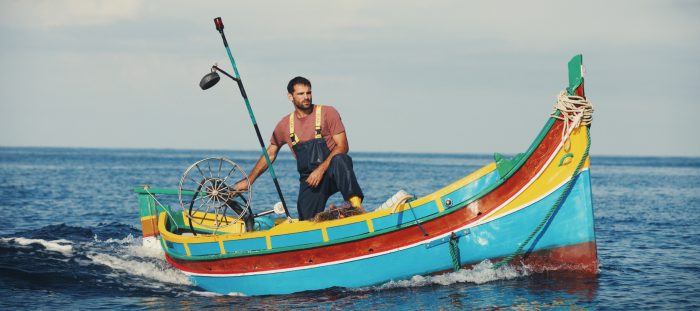‘Luzzu’ Review: A Heartbreaking Neorealist Fishing Drama About A Man Caught in the Tides of Change [Sundance 2021]

Flitting around the giant industrial trawlers that haul in hundreds of fish every day are the bright, colorful luzzus, the small but sturdy traditional fishing boats of the Maltese islands, painted in vibrant yellows, and blues, and reds that create beautiful little beacons scattered throughout the surrounding seas. But the luzzus are slowly disappearing, its owners being pushed out of business or bought out by the government. They’re a dying breed, to which Alex Camilleri‘s neorealist drama Luzzu pays somber homage.
Part maritime moral fable, part unexpected crime drama, Luzzu opens with Jesmark (Jesmark Scicluna), a Maltese fisherman who has long operated the wooden luzzu that belonged to his father — and his grandfather and great-grandfather before that — finding a leak in his beloved boat. Grounded indefinitely while he waits for his luzzu to get fixed, Jesmark finds that his already-frail livelihood is on the verge of collapsing altogether; facing new financial burdens with his newborn son, increased fines and restrictions from fishing authorities, and auctioneers who refuse to sell his wares at the price they deserve.
“No boat…you’ll get lost,” one of his fellow fishermen remarks to him as Jesmark grows increasingly desperate for work. Jesmark sees it too — he needs the sea beneath his feet or he’ll suffocate from the modern excesses that force their way into his life; in the form of his sneering upper-class girlfriend’s mother, in the form of his former fellow fisherman who had sold his luzzu for a nice payout, in the form of the crushing burden of day-to-day life.
Facing pressure from his girlfriend (Michela Farrugia), who suggests that he get work on one of the reef-destroying trawlers which the idealistic Jesmark shoots down immediately, Jesmark starts to explore the world of Malta’s fishing black market, an illicit operation run by the very auctioneers who turned their nose down at him. It’s a slippery slope, but Jesmark is desperate: he soon finds himself running transports, handing out bribes to politicians, and retrieving illegally caught fish. It’s only when he’s too far gone, having become a bonafide grunt for the seedy operators of the black market, that he realizes how lost he’s become.
Remarkably, Luzzu‘s shift from neorealist fable — with Camilleri casting several real-life fisherman in supporting roles, and working heavily with natural light to achieve an almost documentary-like feeling — to crime drama isn’t out of place. Rather, it feels like the beginnings of the Greek tragedy that had been telegraphed from the beginning: the Sisyphean image of a man holding back the flood of change with a rickety wooden boat, the leak in the luzzu marking the beginning of the real world spilling in. It’s in that realm that producer Ramin Bahrain‘s fingerprints can be spotted all over Luzzu, the 99 Homes director handing protégé the tools to pull off the crime drama thrills that the film needs to make a fishing black market compelling. But it’s in Camilleri’s hands that the seemingly disparate parts of the film work, and in Scicluna’s tortured performance as a man caught in the unstoppable tide of change.
Jesmark is only one man, and he can only do so much in the face of a force bigger than he can fathom. The effects of climate change, of economic distress, act as some invisible hand pushing his head further down into the sand. Even so, he can’t help but feel wistful for that dying livelihood when he brings his son to his finally-fixed luzzu, printing his son’s tiny foot on the side just as his father had done for him before. But the bright new paint job and new silicon reinforcements can’t hide the fact that this is already a dead boat to him, even as the luzzu’s trademark eyes look sadly on as he abandons it.
It’s a heartbreaking, but clear-eyed look at the last gasp of a dying industry, and a man whose whole identity, whole livelihood gets shattered by a force beyond his comprehension. In the final moments of Luzzu, Jesmark tells an old parable to his son, of a boat whose parts slowly get replaced until none of the original boat is left. Is it still the same boat? Jesmark doesn’t have an answer, and neither does Luzzu, which leaves us on a sobering note that maybe none of us can stop the inevitable.
/Film Rating: 8.5 out of 10
The post ‘Luzzu’ Review: A Heartbreaking Neorealist Fishing Drama About A Man Caught in the Tides of Change [Sundance 2021] appeared first on /Film.
from /Film https://ift.tt/3j6cVPi
via IFTTT
Comments
Post a Comment